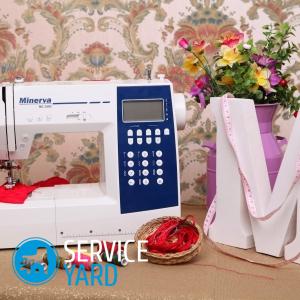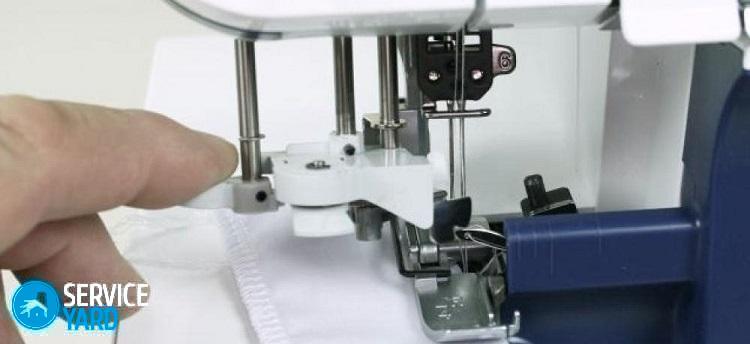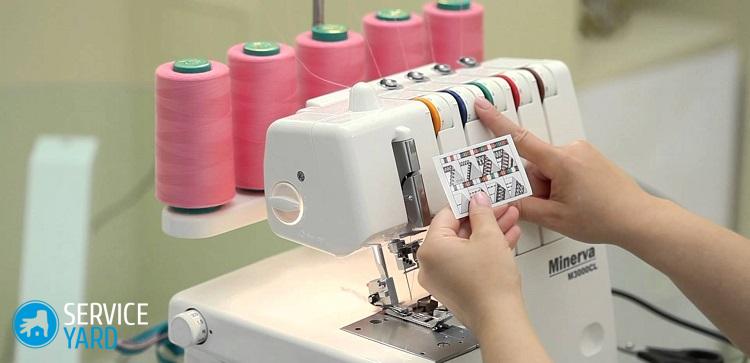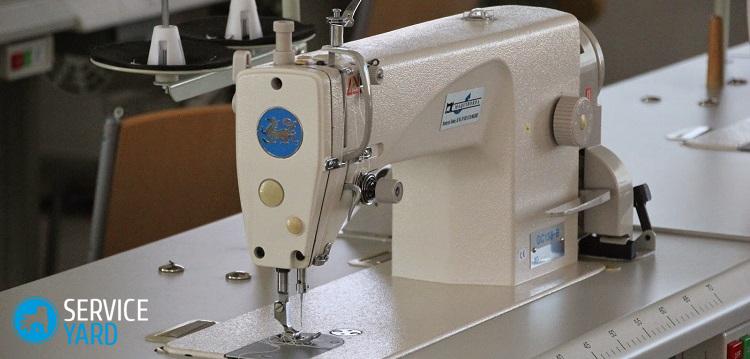How to choose an overlock?

If you love and know how to sew, one of the most useful devices is the overlock. It has many useful features, such as processing seams so that they do not open, trimming unnecessary fabric, and much more. However, the question of how to choose an overlock for the home is asked by virtually every buyer. Indeed, this is a very painstaking work, because without knowing all the functions and nuances, you will not be able to independently choose an overlock for home use. Fortunately, there are always consultants in stores who will help you find the best option for you, taking into account absolutely all your wishes. And if you decide to delve into all the details of this process yourself, our article will help you.
to contents ↑General Provisions
Many people confuse the concept of overlock and sewing machine, which is absolutely not worth doing. Both devices have their own functions that they perform. If a conventional machine works in order to stitch clothing elements and, if there is an appropriate function, can process seams, then the overlock is intended only for processing edges and fixing seams.
to contents ↑Important! The range also ranges from economical, budget options, which are often purchased as an overlock for knitwear for the home, to the huge, multi-functional models that are used in industrial factories. That is, the main role in the question of how to choose an overlock has the device functions that you need.
Overlock Features
Overlocks began to be produced and manufactured back in the Soviet Union, but to date, those long-standing brands are of no interest to anyone. They do not have as many functions as they are today in the sales market. For example, the more expensive the model, the more features there are.
Important! You can process the edges in 3-5 threads, make an overcast seam, be able to process carpets, knitwear and much more. When choosing an overlock, there is no better or worse, because everyone has their own goal, that is, the choice is always individual.
Useful advice - when buying, do not focus on the design of the equipment, but only on the quality. Try to answer these questions yourself and the choice will be reduced, indicating priorities:
- What are you looking for overlock for?
- What materials need to be processed?
- What seams should I use?
- How often will the device be used?

Overlock sewing machine
If you are interested in how to choose an overlock for home use, feel free to skip industrial devices right away, as they are much more expensive in price and have many functions that are not really needed for a home.
The main point that you need to pay attention to when choosing a sewing machine is what fabrics you can work with and what features of the edges are present. As a rule, in economy options for home use there are all commonly used functions. More expensive models will please with advanced functionality - for example, computer embroidery.
to contents ↑Household overlock
It is equally important not only to know how to choose an overlock for the home, but to have information about different models from different users. So you will be aware of the advantages and disadvantages of this particular model.Accordingly, it will be easier to determine for yourself whether this is right for you.
Important! The most common drawback that users are actually dissatisfied with is the difficulty or inconvenience of threading loops into loopers. Therefore, at the moment, this is one of the important selection criteria.
Also determine for yourself immediately whether you have to work with knitwear. This is a fairly complex fabric, for which certain functions and means are needed. If the answer is yes, then, choosing an overlock for knitwear for the home, focus on models with high accuracy and quality.
However, be aware that you will have to purchase a carpet - a device in which there is an additional chain stitch looper. It makes it possible to make a good quality knitted seam. Naturally, this will add the functionality of your model, but in most cases it increases the price quite enough. More details about this type of sewing technique are written in a separate article. “Coverlock - what is it?”.

How to choose an overlock for an atelier?
If you need to purchase overlocks for an atelier, in no case do not take ordinary household ones, as this will not make any sense. When choosing, be sure to pay attention to the following points:
- Overlock must be very powerful and withstand continuous continuous use.
- Have a wide range of functionality.
- Have additional necessary properties.
When choosing a device in the studio, you should also pay attention to the width of the processing of the cut of the working fabric. Quite practical is the presence of an over- and a carpet, which help regulate the maximum width of the seam.
Important! When buying, pay attention to the presence of a differential, because it is with the help of it that it is possible to qualitatively overcast elastic and knitted fabrics.
In order not to make a mistake and purchase models equipped with all the necessary properties, consult a person who is well versed in this and, if necessary, will be able to help you.
Important! In order to save a lot of time, when buying, pay attention to the fact that automatic threading is integrated. This applies to both over and carpet.

How to choose a manufacturer?
To date, there are many different firms for the manufacture of overlocks, of which the following are worth highlighting:
- It should be noted firm "Merrylock". Its specialization is quite narrow, which makes it possible to pay maximum attention to the development of technologies of this particular kind. So far, this company is a leader in the sales market.
- No less good is the Japanese company "Juki", whose devices are famous for their high speed, good performance and reliability. The goods created by this company are able to cope with all types of fabric, even the most problematic ones, which ensures their demand.
- No less popular are the firms Minerva, Jamone. They sell equipment in approximately the same price segment with similar characteristics.
How to choose threads for overlock?
A significant factor is the choice of threads. It is important to be able to choose those that are suitable for both over and carpet, as well as for different types of seams and fabrics.
The highest quality threads have the following characteristics:
- Thin.
- Stretchy, but not too stretchable.
- Straight, not twisted threads.
The following types of threads are strictly contraindicated:
- Cotton.
- Thick or thickened.
- Different quality and thickness.
Important! We can say with confidence that the quality of the thread will depend on:
- firstly, the result of the product;
- secondly, the durability of your devices.
That is, if you manage to choose a good overlock for home use, but you pick up threads of dubious quality, you should not count on the ideal end result of sewing. And the reason will not be in the equipment.

Design
A fairly common question on how to choose an overlock for a home - is design important? Of course, when choosing an overlock it is impossible to put the criterion of appearance in the first place. This is at least illogical and unreasonable, while the quality and functionality of the device are considered really important.
Definitely, some attention should be paid to design, because if we like what we work with, then productivity and desire will increase. But nevertheless, this is far from the main criterion and choose the second between beauty and quality. Moreover, if the device is not in a conspicuous place and is used not so often.
to contents ↑Important! To make it easier for you to organize your workplace, we suggest you use a simple master class to make a comfortable table for the sewing machine.
Stock footage
So, if you carefully read this article and followed all the instructions, then there should be absolutely no problems on how to choose an overlock for home use. We hope our tips and tricks will help you choose an overlock in full compliance with functionality, quality and price. I would like to believe that you have learned a lot of new and useful information on a topic of interest to you and henceforth there will be no questions regarding overlocks and threads. We wish you good luck in your search for your ideal overlock, as well as in sewing and needlework.





